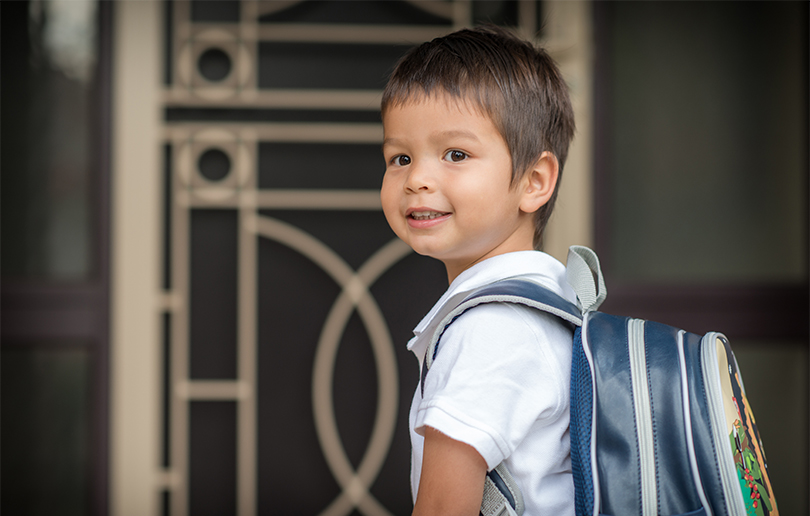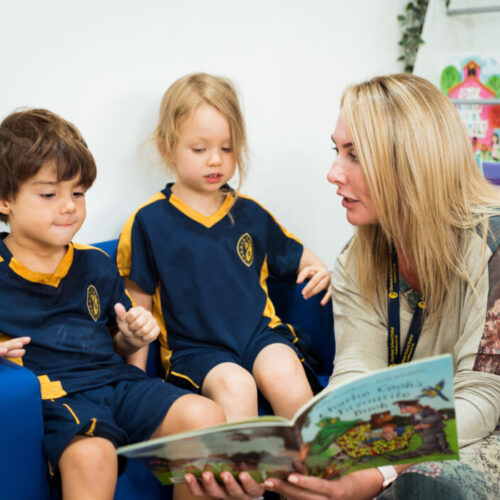Ten ways to ease the transition between nursery and Foundation Stage one in Dubai
Experts from Kings’ School Dubai explain how you can make the transition from nursery to Foundation Stage one in Dubai easier for your little ones…

1. Encourage independence
One of the biggest factors which can help children enjoy a smoother transition to Foundation Stage one (FS1) is having the confidence that comes with learning to be more independent.
“There are many ways parents can support this, by talking through the school experience to get them excited, for instance, and encouraging them through play and by taking on simple tasks around the house,” says Rebecca Mundy, head of foundation, Kings’ School Al Barsha.
“While it’s not a req’uirement that children attend nursery before coming to FS1, we do find the experience helps them feel more confident settling away from their parents as they already know they’ll be collected at the end of the day, so they don’t feel as anxious.”
2. Start them young
Mastering simple skills will help children on their way to becoming model preschoolers. “Even as babies, we involve children in easy activities, such as taking their shoes off,” says Karen Hollas, nursery manager at Child’s Play Nursery, the feeder nursery for Kings’. “Of course, they won’t be able to do it by themselves for some time, but it gets them into the habit and starts to foster independence and life skills from a very young age. The younger they start, the better.”
3. Be their cheerleader
When your child is learning something new, make sure you offer lots of encouragement and praise. “Those who are shy may simply need a demonstration or that little bit of encouragement using the correct body language and tone of voice along with ‘wow’ words and extra praise,” says Karen. “Never underestimate what a child can do as they will always surprise you.”
4. Get them talking for Foundation Stage one
Children will need to demonstrate good communication skills such as being able to engage in basic conversation and answer open-ended questions. “Key to developing good communication skills is to talk a lot with your child,” says Karen. “From chatting through your daily journey or routine and what you see around you to saying ‘good morning’ to people you meet along the way – all this helps to engage the brain as well as speech and language skills. If we feel children are having some issues with speech, we can tackle it early with simple exercises such as bubble blowing to help get the mouth moving, as well as the repetition of simple words.”
5. Swot up on the assessment topics
Find out what’s involved in the assessment process so you can be well prepared. “The Foundation Stage one assessment is commonly a play-based observation that takes up to 20 minutes. I don’t believe this is a fool proof way to ‘test’ small children, however, as they may have had a bad night’s sleep or be feeling a little under the weather that day which may affect how they interact at that particular time,” says Karen. “This is why we worked with Kings’ to expand the assessment criteria to offer a more holistic view of a child. We have a questionnaire that parents can complete to give background knowledge from home and end-of-term reports from nursery teachers to offer a supporting view of the child’s development, which is also taken into account.”
6. Make it more familiar
“Prior to the first day of Foundation Stage one, our children are invited to attend play sessions with their parents where they can come and meet the teacher and take a look at their new learning environment,” says Rebecca. “Each child takes home a mini biography of their teacher featuring their photo so they become a familiar face.”
7. Get on top with self-care
Encourage your child to feed and dress themselves and take ownership of their belongings – something that’s expected of all children from the beginning of Foundation Stage one. “Parents are often concerned about children being able to manage their selfcare skills independently,” says Rebecca. “We do ask that all children are toilet trained before they join us in Foundation Stage one, but we do support children who need it when using the bathroom, dressing themselves or feeding themselves during snack and lunch time.”
8. Help set the boundaries
“As children settle, there may be some issues around learning how to manage their emotions and behaviour,” says Rebecca. “As a school, we will communicate any issues to parents and work together to ensure we are supporting the child to build relationships and manage their own behaviour in and out of school.”
9. Support their learning
“Children often come to school writing in capital letters and saying alphabet names for sounds,” says Rebecca. “Parents work with them at home and have good intentions to support their reading and writing, however this does often mean we have to un-teach and re-teach content in school. We would ask that parents only model writing in lowercase letters and when learning letter sounds to only teach them the ‘pure’ sounds.”
10. Create a positive atmosphere
“Although it can be an anxious time for parents, it’s important to show children how excited you are and how important it is that they come to school in order to help their brain grow,” says Rebecca. “It is a very special time when a child starts school so please trust that we are doing everything we can to help your child feel confident, safe and happy.”










